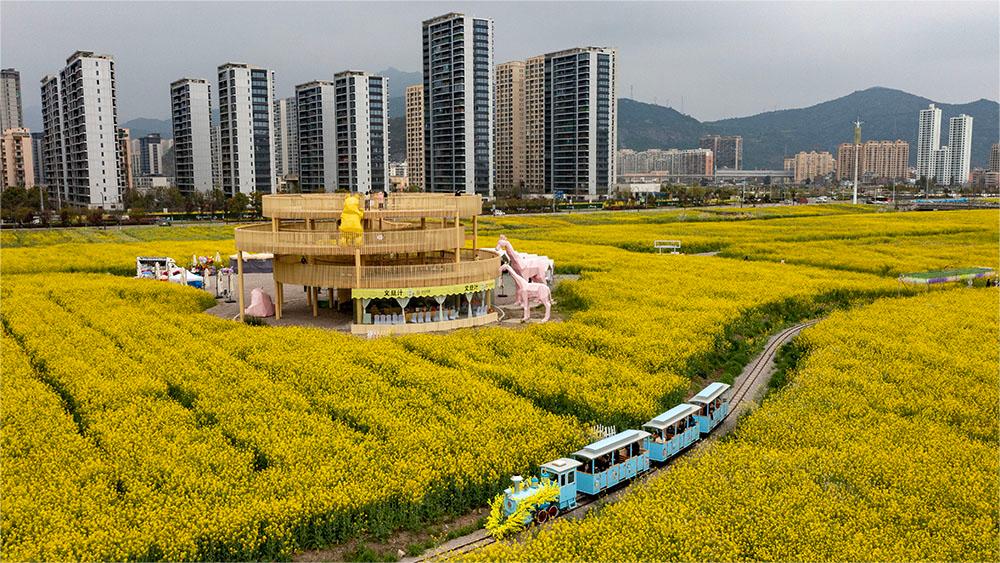Digital "resurrection" services stir debate on love, death and AI
NANNING, April 5 (Xinhua) -- Would you want a deceased family member to remain in your company, listening to your complaints and chatting with you, even if they were just a digital phantom created by artificial intelligence (AI)?
This question has gripped the internet in China in the days surrounding Qingming Festival, a time of the year when Chinese people pay tribute to the dead. It has risen in response to a plethora of commercial services claiming to create digital replicas of people's deceased loved ones.
A man from south China's Guangxi Zhuang Autonomous Region was recently able to see his deceased grandfather once again after providing an AI tech firm with photos, voice recordings and personalized backgrounds.
The 29-year-old, who opted to remain anonymous, told Xinhua that he had regretted not being able to bid a last farewell to his grandfather for years. Now, every evening after work, he spends a few minutes chatting with his "digital grandfather."
"I tell him my work problems, and he shares his experiences as a soldier with me. Even though these conversations are based on the information I provided, I am still pleasantly surprised because he talks to me the same way he used to when I was a child," he said. "It's a great comfort to me."
Numerous AI "resurrection" services are on offer on China's e-commerce platforms, with prices ranging from 10 yuan (about 1.4 U.S. dollars) to more than 10,000 yuan.
Zhang Yuqiang, co-founder of an AI technology company based in Nanning, the capital of Guangxi, noticed an explosive increase in requests for the company's "digital relative" services, which were launched in February, ahead of the Qingming Festival that falls on Thursday.
The company provides two such services: It can clone a voice and image to create a video conveying blessings, and it can create a digital clone capable of engaging in simple conversations.
"Creating a digital relative requires audio recordings, photos and information on the life experiences of the deceased individual. The more data that is provided, the closer the digital replica will be to the real person," Zhang said.
Such services have been met with mixed feelings on China's social media. Many netizens said they had been touched by a video in which a blogger used AI face-swapping software to "resurrect" his deceased father and console his frail grandmother. And a viral AI-generated video in which a deceased celebrity singer greets her fans has prompted the singer's family to demand its removal, saying it had "reopened old wounds."
Liang Jia, a psychiatrist and a member of the Chinese Medical Doctor Association, said that talking with the digital replicas helps people maintain an emotional connection with the dead and allow those who have lost their loved ones unexpectedly to complete the mourning process.
Some interviewees have also expressed concerns over excessive reliance on virtual reality. "Talking to digital relatives will only tear open my wounds by reminding me that they have passed away," said a 20-year-old university student in Guangdong Province who has recently lost his grandfather.
This technology could also face legal issues. "If technology is used to 'resurrect' non-relatives or public figures without appropriate authorization, it could constitute infringement, or it could be used by criminals to commit fraud or defame the individual in question," said Ning Naiming, a lawyer based in Nanning.
Feng Gui, a member of the China Law Society, said that bereaved relatives in China can legally ask a company to "resurrect" a deceased individual using AI technology. "But if there is disagreement among close relatives regarding whether to 'resurrect' the individual through AI, then controversy occurs."
Shen Yang, a professor of AI and big data at Tsinghua University, said that the advancement of AI technology has given rise to a question on whether "digital resurrection" should be a legal right.
Flipping the question posed at the beginning of this article, would you consent to an AI using your voice and image to keep your family members company when you are gone?
"Does everyone want his or her image to remain in the world after death? This could be a new question in the AI era," Shen said.
Photos
 Migratory birds spotted in Karamay, NW China's Xinjiang
Migratory birds spotted in Karamay, NW China's Xinjiang Tourist-dedicated New Orient Express gears up to offer luxury train travel around NW China's Xinjiang
Tourist-dedicated New Orient Express gears up to offer luxury train travel around NW China's Xinjiang Spectacular sea of blooming rapeseed flowers attracts tourists to Yueqing, E China's Zhejiang
Spectacular sea of blooming rapeseed flowers attracts tourists to Yueqing, E China's Zhejiang Rare bird species spotted in north China's grassland
Rare bird species spotted in north China's grassland
Related Stories
- China accelerates AI development to build AI innovation center
- The South of Colorful Clouds: Human x AI song collab
- Sri Lankan gov't to support country's first AI-based film production
- AI empowers traditional Chinese medicine to explore new potentials
- Experts, execs stress responsible AI
- Experts at Boao forum express optimism about AI but urge oversight
- New technologies bring opportunities, challenges to democratic practices: experts
- AI-powered smart farming system improves production efficiency in Anhui
- G7 industry ministers commit to "safe and reliable" AI
- China calls for advancing AI to protect children's rights
Copyright © 2024 People's Daily Online. All Rights Reserved.





